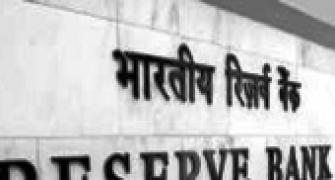 Banks have, on the Reserve Bank of India's indication, repeatedly raised interest rates. In the recent monetary policy review, RBI has again raised the rates at which it lends and borrows from banks. Banks would revise borrowing rates upward.
Banks have, on the Reserve Bank of India's indication, repeatedly raised interest rates. In the recent monetary policy review, RBI has again raised the rates at which it lends and borrows from banks. Banks would revise borrowing rates upward.
Most mortgage borrowers are in the floating rate category, having mortgages running in excess of 120 months (10 years).
Rising interest rates can affect their monthly cash flows, especially if they have a long-tenure loan (of 20 years).
Small measures can help you to tide over such a situation, while maintaining steady cash flows. Take Haresh Soneji, who took a 20-year loan of Rs 25 lakh (Rs 2.5 million) on January 1, 2010 (see table: Rate hike impact). There were two rate rises of 0.5 per cent each, effective July 1, 2010, and January 1, 2011. Thus, his tenure is currently 24 years and five months, instead of the remaining 19 years.
Here are options for Soneji and others facing the same problem:
PREPAYMENT
If you have funds, ideally in a bank account or in a long-tenure fixed deposit, the money can be used to repay the loan. This indirectly puts existing money to good use.
In Soneji's case, if he prepays Rs 100,000 towards the principal payment outstanding, it will keep the tenure unchanged and increases the equated monthly instalment by just Rs 660 each month. This is a shift closer to maintaining the target towards loan repayment on schedule. To be able to maintain the same EMI, Soneji would need to pay Rs 167,200.
However, lenders have a fine print on prepayment. For example, a private lender allows prepayment only once a financial year. Another allows prepayment up to 25 per cent of the outstanding in a financial year. In either case, you can prepay in February or March and again in April-May to lower your EMIs.
Similarly, if one has availed of a "smart home loan" or two-in-one accounts, where deposits maintained by the borrowers earn above average interest rate, borrowers should either start depositing greater amounts in such credit accounts or simply deposit the salary into this account, which can be used for all expenses. The daily average balance will increase, resulting in lower interest on home loans.
VOLUNTARY INCREASE
Another option is to go for a voluntary increase by a higher amount than suggested. In our example, the lender had sent a letter to Soneji in December that his EMI would be raised by Rs 1,640 next month onwards.
The idea here is to make a higher provision than what is stipulated. By doing this, one is better positioned to reduce the principal and thereby save on higher interest charges, earlier than the bank's schedule.
This could be a difficult proposition, unless income has increased since the loan started and the family has a monthly surplus. In our example, Haresh would have increased the EMI by Rs 2,640 each month and his tenure would be lower by 24 months. This will also cushion the impact from interest rate increases in the future.
However, not all banks would allow such an increase. Check with your lender if there is a possibility to increase the EMI voluntarily.
CHANGE LENDERS
Shopping aggressively for loan switching also pays off. Usually, lenders offer attractive rates to attract new customers.
Keep in mind the following while opting for this:
- Check the pre-payment penalty and foreclosure norms of the existing borrower. A leading housing finance company introduced penalty of 4 per cent on the outstanding principal, if a customer shifts to a new lender. Such a penalty would defeat the entire purpose of switching the loan.
- Check for fine print from the new lender. Often, lenders lure borrowers with sweetened deals in the initial period, with sharp reset clauses later. This defeats the entire exercise and makes the loan switch a burden. Give preference to a bank rather than non-banking financial company. After the introduction of base rate, banks have become more transparent in hiking interest rates for the existing customers. NBFCs do not have a transparent benchmark as of now.
FLYING LOW BEFORE SOARING LATER
If you cannot do any of these, request the lender to increase the tenure, keeping your EMI constant. This is what most lenders do by default, whenever there is rate hike.
However, this is not the long-term solution. You need to bring down the tenure, too. Else, it would make the cost of house acquisition high. This is because as the tenure increases, you will need to pay more interest.
While you may get a breather for a while, you must work towards creating a buffer to bring down the tenure, and prepare yourself for such situations in future. A borrower can keep aside bonuses, incentives and such windfall to partially prepay the home loan. A person can also use instruments such as recurring deposits to create a regular cash flow that can take care of the rise in EMIs.
The writer is a certified financial planner








